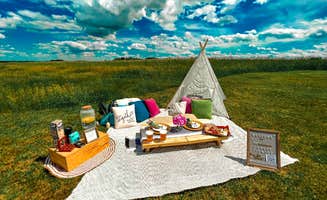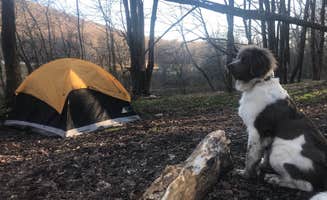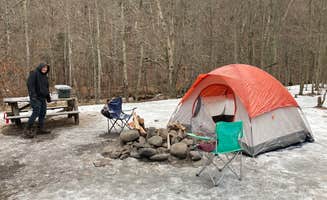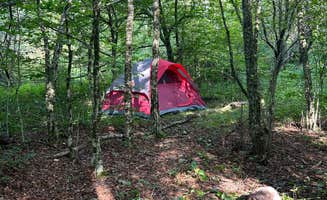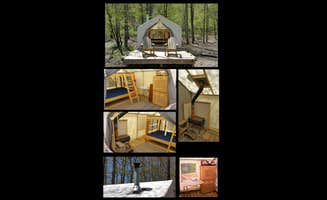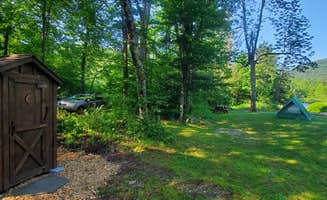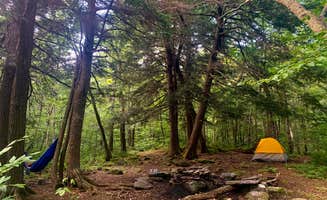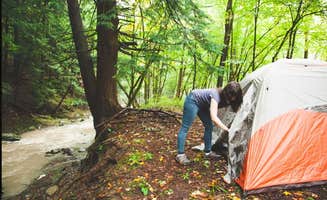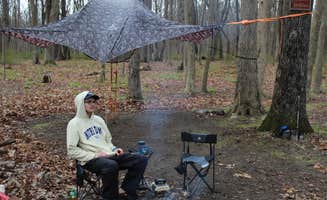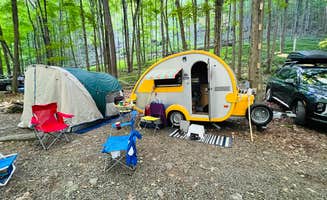Tent camping near Jeffersonville, New York offers diverse experiences across multiple terrain types within the Catskill region. Elevations range from approximately 1,000 to 3,500 feet, creating varied microclimates where summer temperatures often stay 5-10 degrees cooler than surrounding lowlands. Fall camping seasons typically extend into late October with nighttime temperatures dropping into the 30s, requiring proper cold-weather gear for overnight stays.
What to do
Waterfall exploring: Several campgrounds offer access to notable waterfalls within hiking distance. At Peekamoose Valley, campers can take a short hike to see multiple cascades. As one camper noted, "We went hiking, and there are lots of cool hikes close by to do so. Really cool spot, can't wait to return."
Stargazing opportunities: Giant Ledge Primitive Camp provides exceptional night sky viewing from elevated positions. "Yes you can star gaze by the views near the camp. Yes it's amazing. It take the average hiker about an hour ish to get to camp/ledge view," writes one reviewer who ranked it among their favorite camping experiences.
Paddle sports: Namanock Island offers a unique island camping experience accessible only by water. A camper described the journey: "Namanock Island is only accessible by water and is roughly 4 miles down the Delaware River if you leave from Milford Beach in Milford, PA." The paddle takes approximately 1-2 hours depending on water conditions and paddling experience.
What campers like
Privacy between sites: Most primitive campsites in the region provide good separation between camping spots. At the Peekamoose Valley, a camper reported, "I stayed in the middle field campground site #6... the other sites are nice right by the river, and there is plenty of privacy between spots."
Natural soundscapes: The remote locations provide peaceful audio environments dominated by natural sounds. A visitor to Peekamoose Valley shared: "At night, the only noise you'll hear is from the river and animals in the forest which is of course an added benefit!"
Weather variability: Many campers appreciate the chance to experience changing conditions. One camper at Giant Ledge noted, "Even the rain couldn't ruin this weekend getaway. The spring water source is a short hike back from the campsite, relatively convenient to restock from camp."
What you should know
Hiking difficulty: Some sites require significant physical effort to reach. A camper at Giant Ledge warned: "It is a near vertical hike the first mile with 90% or more being over rock gardens. Not some rocks littering the trail. I think the trail used to be a stream or creek. It doesn't wind its way up the mountain."
Water sources: Reliable drinking water is scarce at most sites. Bring filtration systems or carry sufficient water. At Alder Lake, a visitor noted, "Was able to tent fairly close to the lot. No cell service. If you bring a handsaw youll be good for firewood. Bugs were pretty bad."
Road conditions: Many access roads are unpaved and rough. One Alder Lake reviewer mentioned: "The place is pretty easy to access with paved road the whole way there except for the last 1/2 mile where it is very bumpy. Some might say 4*4 but we made it just fine in our little Camry."
Seasonal popularity: Weekends from June through September often reach capacity by midday. A camper shared their experience: "We arrived around 11:00 am and the parking lot was already packed and cars were lined up along the road. We grabbed one of the three spots that were left."
Tips for camping with families
Choose water-adjacent sites: Camping areas near water features provide natural entertainment for children. At Namanock Island, a visitor reported: "The site was super clean and well maintained! Lots of peace and natural all around. Saw tons of bald eagles flying near the site and while paddles birds playing and baby geese with their mommas!"
Weather preparedness: Temperature swings of 30+ degrees between day and night are common, especially in spring and fall. Pack accordingly. A Giant Ledge camper advised: "Bring a bear bell and bear mace can to be safe. We did not see any but definite signs of them. Get tracking poles if you don't already have some."
Consider access difficulty: Many primitive sites require carrying all gear significant distances. One Peekamoose Valley camper observed: "I was in the lower area and had to walk pretty far with everything and make at least 6-8 trips for each load-in and out. I went and bought a wagon after the first day to carry the firewood down to our site."
Tips from RVers
Small RV accessibility: Only certain areas accommodate small recreational vehicles. An Alder Lake visitor shared: "Love this place will definitely be back, not sure why it didn't show up for free camping when I had it filtered, found it on another app. Was not the easiest for my RV van to get up the hill with the ruts, but I have a small lift so it helps, lower clearance vans might not make it."
Designated RV areas: Look for specified zones at campgrounds to avoid access issues. A visitor explained: "There are three campgrounds (upper, middle, and lower field) and a trailer field for a total of 24 campsites. Calling them 'fields' might be misleading - they're heavily wooded areas by a river."


